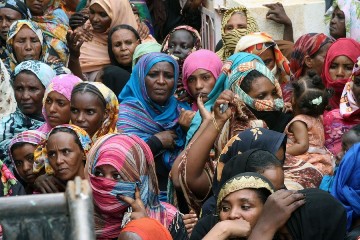Sudan says floods situation does not amount to “disaster”
August 15, 2013 (KHARTOUM) – The Secretary General of the Arab League Nabil Elaraby called on member states to provide urgent humanitarian relief to the victims of floods and heavy rainfall that hit large parts of Sudan this month.

Elaraby said that the Arab League will continue to be in touch with Khartoum to get updates on items it needs to deal with the floods and the resulting humanitarian crisis.
Yesterday, Kuwait joined a string of countries which announced that it will dispatch $2.5 million in relief supplies to Sudan as decided by cabinet meeting.
“The decision was taken after assessing hard conditions of the brotherly Sudanese people, as a result of the floods and heavy rains that inflicted extensive losses,” the Minister of State for Cabinet Affairs and Minister of Health, Sheikh Mohammad Abdullah Al-Mubarak Al-Sabah in told Kuwait’s official news agency (KUNA on Wednesday.
“The cabinet has instructed Kuwait Red Crescent Society to coordinate with the Foreign Ministry to secure the relief supplies as soon as possible,” Kuna reported.
So far the United States, Japan, Qatar, Egypt and Ethiopia have sent aid to Sudan though more help is believed to be needed.
On Thursday, the Sudanese interior minister Ibrahim Mahmoud Hamid told reporters that his ministry’s figures show that 53 people were killed, 77 inured, 40,578 families affected, 20,207 homes completely collapsed and 21,999 partially damaged, 3,000 heads of livestock perished and 251 public buildings were impacted that were primarily schools.
But the minister insisted that the losses so far do not warrant declaring Sudan a “disaster area” which would potentially help solicit more external aid and stressed that the situation is under control.
Hamid added that the Nile river levels at the Murgan station in Khartoum registered 17.4 meters.
The governor of Khartoum state Abdel-Rahman al-Khidir today disclosed his state was hit by 2 billion cubic meters of water stressing that it could have inflicted significant damage if it wasn’t for the existing drainage points.
Sudan’s chief weather forecaster warned on Thursday that more floods should be expected in the coming days.
“According to our information there is heavy rain in Ethiopia, and we expect flooding in the coming days,” Abdallah Khiar told reporters according tto Agence France Presse (AFP) .
Rains in Ethiopia feed into the Blue Nile river which runs to Khartoum, Sudan’s capital.
He called on imams to urge citizens and young people to contribute to discharging water in residential neighborhoods and contribute to the fund established by the state to support those affected.
Al-Khidir hailed the role of national organizations, particularly the Red Crescent, saying it is playing an active role in correlation with the state to account for those affected and help in delivering aid to them.
The International Federation of Red Cross and Red Crescent Societies (IFRC) said on Thursday that it launched an emergency appeal for 918,554 Swiss francs ($983,670) to help 35,000 people in Khartoum and River Nile states..
Eight states in Sudan have been hit by flooding triggered by heavy rains that started in early August, damaging schools, health clinics, shops, markets and sanitation facilities, IFRC said.
“The hardest hit areas include the states of Khartoum, Gezira, Northern and River Nile,” the IFRC added.
“Some displaced families, mostly women and children, are camping along the tarmac road, others have found shelter staying with relatives who have homes on higher ground,” the group added.
(ST)
